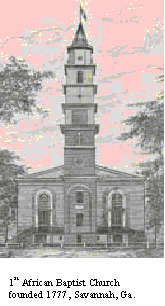|
KWANZAA AND THE AFRICAN AMERICAN CHURCH |
|
Celebrating History Language and Culture |
 Edited
By: Baba Kwasi, Dec. 9. 1999 Edited
By: Baba Kwasi, Dec. 9. 1999As we approach the holiday season and the end of a year, we prepare ourselves for various holiday rituals, shopping, eating, fellowship with friends and family, Christmas, Eid, Hanukkah and Kwanzaa. Kwanzaa is a culturally focused celebration of friends and family, however it has also become mistakenly commercialized as a sort of black Christmas. There are those who mistake Kwanzaa as some sort of religious celebration. When we explore the basic definition of religion we understand it
as “a way of life” or to go back (re) and attach (ligion) or Sankofa
(learn from the past). The seven
principles of Kwanzaa define basic attributes that one must have in order
to achieve a better way of life.
These principles are found in the History of the AFRICAN-American
church. I had the opportunity
to tour the First African Baptist church back in April 1999.
Within walking distance from the Atlantic Ocean, the church served
as a hide away for run away slaves during the Underground Railroad.
UMOJA
(Unity) Free and enslaved Men and Women worked together to build the First
Colored Baptist Church and in demonstration of their KUJICHAGULIA
(self-determination) took the bold step to identify faith in their
heritage by later renaming the church to the First African Baptist Church.
Many Black churches prior to the 20th century used the
word Africa as part of their church name.
One of the original pews had the carving of a signature of a slave
who was Muslim.
UJIMA
(collective work and responsibility) and UJAMAA (cooperative
economics) Churches like the Michigan Street Baptist Church, established
1845 in Buffalo, NY would help pay for items for runaway slaves by
collecting money from the community members while some women made and sold
quilts to assist in the secret boarding of the slaves.
It took KUUMBA (creativity) for members to come up with spiritual music and songs of survival that were cryptic to the slave owners, like “Run to Jesus, shun the danger, I don’t expect to stay much longer here” and Steal away, steal away, steal away to Jesus. It
goes without saying that these Africans in America had a NIA
(purpose) for transforming a religion that slave owners sanctioned as a
way of making their slaves more obedient and humble into a method for
achieving freedom and a better life. STANDING FIRM IN THE FACE OF TERROR Under
the Fugitive Slave Act, which was passed in 1850, the church was taking a
dangerous risk if the government discovered their role in helping slaves
or giving them food, clothing and secret places to hide.
This took a great deal of IMANI (faith) in God and faith in
themselves and those who were sympathetic and supportive to their desire
to be free.
Without
a doubt, these Africans in America did more than get involved with a one
week out of a year ritual. They
were committed to the principles of Kwanzaa every day of their lives as a
way of life. In those days
our ancestors did not have a separation of church and the state of affairs
that governed their lives. Give
me that old time religion.
Food for
Thought Reading
Bible: Psalms Chapter 23 and Chapter 91 My
people are destroyed for lack of knowledge: because thou hast rejected
knowledge, I will also reject thee, that thou shalt be no priest to me:
seeing thou has forgotten the Law of thy God, I will also forget thy
children.
HOSEA 4:6 Study to show thyself approved unto God, a workman that needeth not to
be ashamed, rightly dividing the word of truth. II
TIMOTHY 2:15
Knowledge is power only when directed to an end goal. |